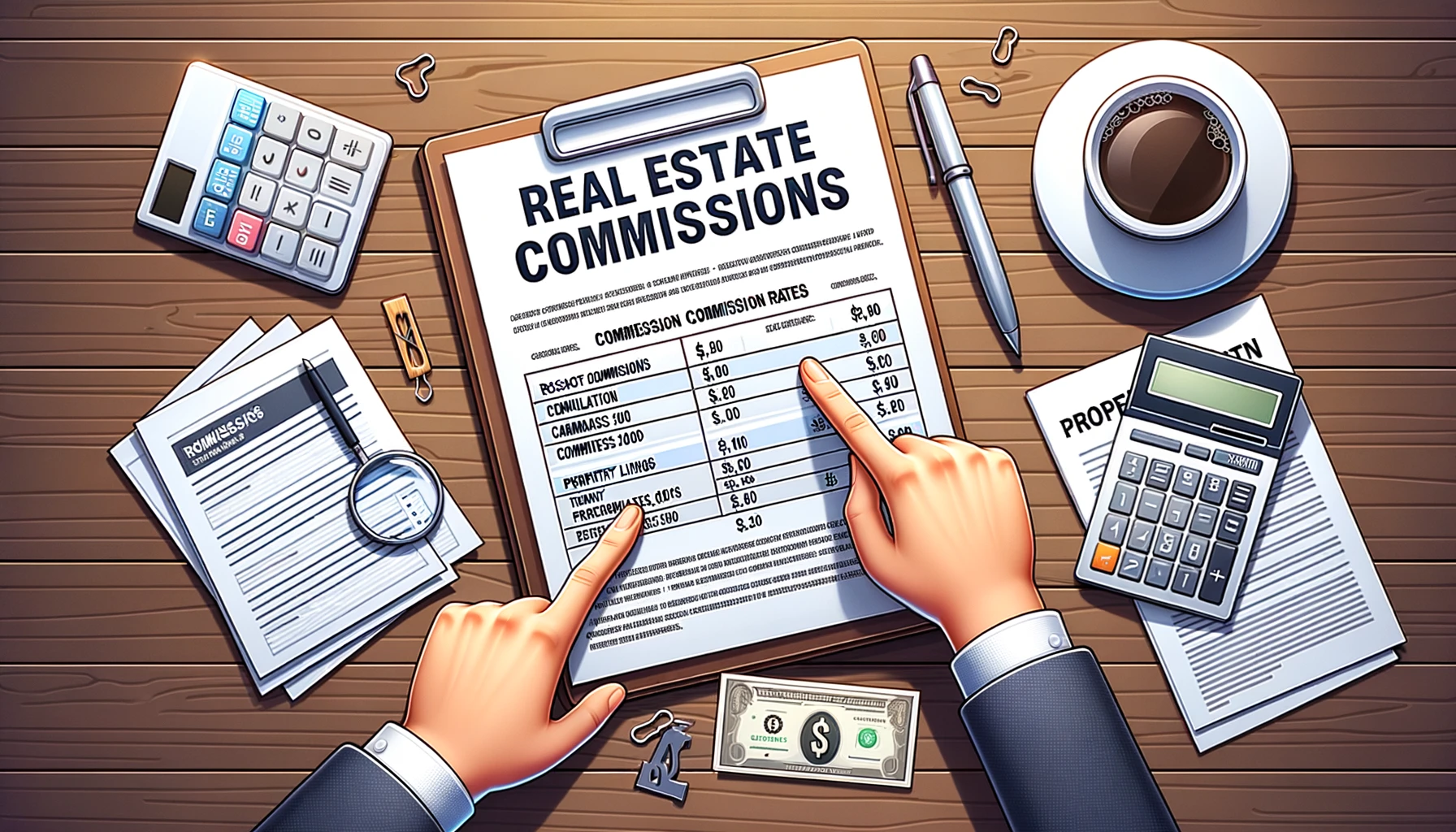When it comes to buying or selling a home, one of the key aspects to understand is how real estate commissions work. Real estate agents are typically paid a commission based on a percentage of the sales price once a transaction is completed. This commission is crucial to compensating agents for their services and can vary depending on various factors.
To fully comprehend real estate commissions, it’s essential to understand how they are calculated. The commission is usually a percentage of the final sale price, typically ranging between 5% and 6% in residential home sales. This commission is split between the brokers representing the buyer and seller, with each agent receiving a portion of the commission.
It’s important to note that some real estate companies operate on a lower commission model, taking between 1% and 1.5% in most markets. Additionally, the seller is responsible for paying the commission at the close of the sale, and it is typically factored into the home’s asking price.
Key Takeaways
- Real estate agents are paid a commission based on a percentage of the sales price.
- The total real estate commission is usually between 5% and 6% of the sale price in residential home sales.
- The commission is split between the brokers representing the buyer and seller.
- Some real estate companies operate on a lower commission model, taking between 1% and 1.5% in most markets.
- The seller is responsible for paying the commission, which is factored into the home’s asking price.
What Is Real Estate Commission?
Real estate commission is the payment that real estate agents receive for their services. Unlike professionals like attorneys or accountants who charge by the hour, real estate agents work on a commission basis. This means that they earn a percentage of the money exchanged in the final transaction when a deal closes. If a transaction is unsuccessful, the agent does not receive any money. The average commission for a real estate agent is around 6% of the sale price.
“Real estate commission is the payment that real estate agents receive for their services. Unlike professionals like attorneys or accountants who charge by the hour, real estate agents work on a commission basis.”
In other words, real estate commission is the compensation that agents receive for their expertise and assistance throughout the home buying or selling process. It serves as an incentive for agents to work diligently to secure successful transactions for their clients.
Understanding how real estate agents get paid is essential for both buyers and sellers. Whether you are purchasing your dream home or listing your property for sale, it’s important to have a clear understanding of the commission structure so that you can make informed decisions and negotiate effectively.
How Are Real Estate Commissions Calculated?
Real estate commissions are typically calculated as a percentage of the final sale price of a property. The average commission rate is around 6%, but this can vary. The commission is usually split between the agent representing the seller and the agent representing the buyer, with each receiving a portion of the commission.
“Calculating real estate commissions is straightforward. It involves multiplying the commission rate (usually a percentage) by the final sale price of the property. For example, if the sale price is $300,000 and the commission rate is 6%, the total commission would be $18,000. This commission is then divided between the seller’s agent and the buyer’s agent, following the agreed-upon split.”
In addition to the agent’s portion, the commission is shared with the agent’s broker, usually at a ratio of 60/40 in the agent’s favor. However, it’s important to note that the commission split between an agent and their brokerage may change over time depending on the agent’s success and experience.
Factors Influencing Real Estate Commissions
Several factors can influence real estate commissions. The type of property being sold, the location, and the current market conditions can all impact the commission rate. Additionally, the individual agent’s experience and success may play a role in negotiating commission rates. Some sellers may choose to negotiate a lower commission rate with their agent, while others may be willing to pay a higher commission for specialized services or expertise.
Tips for Saving on Real Estate Commissions
“To reduce real estate commissions, consider working with a discount or flat-fee brokerage that offers lower commission rates. Another approach is to negotiate the commission rate with your agent before listing the property. Remember that a lower commission rate doesn’t always mean better service. Evaluate the services and expertise provided by any agent before solely focusing on the commission rate. It’s also worth noting that attempting to sell your home without an agent (FSBO) may not always result in the highest sale price and can be challenging without the expertise and resources of a real estate professional.”
Factors Influencing Real Estate Commissions
“The factors affecting real estate commissions can vary depending on various aspects of the property, location, and the current market conditions,” explains real estate expert John Smith. “One of the key factors is the type of property being sold. Luxury homes, for example, often have higher commission rates due to the higher price tag and additional marketing efforts required.”
“Another factor in negotiating real estate commissions is the location of the property,” says Smith. “In highly competitive markets where demand is high, agents may be more likely to negotiate lower commission rates due to the greater potential for quick sales. On the other hand, in slower markets, agents may be less willing to negotiate on commission rates.”
Furthermore, market conditions can also influence commission rates,” emphasizes Smith. “During a seller’s market, where there is high demand and low inventory, agents may have more negotiating power and may be able to command higher commission rates. In a buyer’s market, where supply exceeds demand, agents may be more flexible with commission rates in order to secure a sale.”
Understanding the importance of negotiation
When it comes to negotiating real estate commissions, it’s important for sellers to be aware of the factors at play and to communicate their expectations with their agents effectively. Smith advises, “Having an open and honest conversation about commission rates, while considering the current market conditions and property details can lead to a mutually satisfactory agreement.”

To maximize your chances of successful negotiation, it is crucial to gather information about commission rates in your local market and understand the typical range for your property type and location. This knowledge will empower you to have more informed discussions with potential agents and enable you to make better decisions based on your specific circumstances.
Tips for Saving on Real Estate Commissions
When it comes to selling your home, one of the major expenses to consider is the real estate commission. Fortunately, there are some strategies you can employ to save on these commissions and keep more money in your pocket. Here are a few tips for reducing real estate commissions:
“Consider working with a discount or flat-fee brokerage that offers lower commission rates. These brokerages often charge a fixed fee instead of a percentage of the sale price, which can result in significant savings. Just be sure to carefully evaluate the services and reputation of any brokerage before selecting one.”
Another approach to reducing commissions is to negotiate the commission rate with your agent. While it’s common for agents to charge around 6% of the sale price, this can sometimes be negotiated lower. Remember that a lower commission rate doesn’t always mean better service, so be sure to evaluate the agent’s experience and expertise.
“Selling your home without an agent, also known as FSBO (For Sale By Owner), is another option to consider. By doing the work yourself, you can potentially save on real estate commissions. However, it’s important to note that selling a home without an agent requires expertise and resources, and may not always result in the highest sale price.”
Ultimately, the decision to save on real estate commissions should be weighed against the value and expertise that an experienced agent brings to the table. Consider your own abilities, resources, and comfort level before deciding which route to take. By carefully evaluating your options and exploring different strategies, you can find ways to reduce real estate commissions and maximize your financial outcome.
Understanding Real Estate Agent Commissions
Real estate agent commissions are an integral part of the buying and selling process. As a seller, it’s crucial to understand how these commissions work and what fees you may be responsible for. When you hire a real estate agent to sell your property, they will typically earn a commission based on a percentage of the final sale price. You, the seller, pay this commission once the deal is closed.

“Real estate agent commissions are a percentage of the final sale price and are paid by the seller.”
It’s important to note that the real estate agent’s commission is typically split between the seller’s agent and the buyer’s agent. Each agent receives a portion of the commission, and they then share a percentage of their earnings with their respective brokerages. This division ensures that both sides of the transaction are compensated for their services.
While the average commission rate is around 6-7%, it’s important to remember that commission rates can vary. Your agent may offer a different commission structure based on factors such as the type of property, market conditions, or the level of service they provide. It’s essential to have a clear understanding of the commission fees and any additional costs associated with selling your property before entering into an agreement with a real estate agent.
Why is understanding real estate agent commissions important?
Understanding real estate agent commissions is important because it allows you to make informed decisions when hiring an agent and negotiating commission rates. By knowing how commissions are calculated and divided, you can better understand the costs involved in the selling process and ensure that you are getting the services you expect from your agent.
“Understanding real estate agent commissions empowers you to make informed decisions and negotiate the best possible deal.”
When evaluating a real estate agent, consider not only the commission rate they offer but also the quality of their services, their experience in the market, and their track record of successful sales. Remember, the goal is to find an agent who can provide you with the expertise and support you need to sell your property effectively.
Conclusion
In conclusion, real estate commissions are an essential part of the transaction process and serve as the compensation for real estate agents. These commissions are calculated as a percentage of the final sale price and are typically split between the buyer’s agent, the seller’s agent, and their respective brokerages.
Factors such as the type of property, location, and current market conditions can influence the commission rate. It is important for sellers to carefully consider these factors when negotiating commission rates with their agent.
While there are strategies for saving on real estate commissions, it is crucial to evaluate the services and expertise provided by an agent rather than solely focusing on the commission rate. Working with a knowledgeable and experienced agent can ultimately lead to a smoother transaction and better outcome.
Overall, understanding how real estate commissions work and the various factors that influence them is crucial for both buyers and sellers. By having a clear understanding of the commission structure, individuals can make informed decisions when it comes to their real estate transactions.
FAQ
Q: How are real estate commissions calculated?
A: Real estate commissions are typically calculated as a percentage of the final sale price of a property. The average commission rate is around 6%, but this can vary. The commission is usually split between the agent representing the seller and the agent representing the buyer, with each receiving a portion of the commission. The commission is then shared with the agent’s broker, usually at a ratio of 60/40 in the agent’s favor.
Q: What factors influence real estate commissions?
A: Several factors can influence real estate commissions. The type of property being sold, the location, and the current market conditions can all impact the commission rate. Additionally, the individual agent’s experience and success may play a role in negotiating commission rates. Some sellers may choose to negotiate a lower commission rate with their agent, while others may be willing to pay a higher commission for specialized services or expertise.
Q: How can I save on real estate commissions?
A: There are several strategies for saving on real estate commissions. One option is to consider working with a discount or flat-fee brokerage that offers lower commission rates. Another approach is to negotiate the commission rate with your agent before listing the property. It’s important to remember that a lower commission rate doesn’t always mean better service, so be sure to carefully evaluate the services and expertise provided by any agent you consider working with. It’s also worth noting that attempting to sell your home without an agent (FSBO) may not always result in the highest sale price and can be challenging without the expertise and resources of a real estate professional.
Q: How do real estate agents get paid?
A: Real estate agents are typically paid a commission based on a percentage of the sales price once a transaction is completed. The total real estate commission paid by the seller is usually between 5% and 6% of the sale price in residential home sales. This commission is split between the brokers representing the buyer and seller, and each agent receives a portion of the commission. Some real estate companies, like Redfin, operate on a lower commission model, taking between 1% and 1.5% in most markets. The seller is responsible for paying the commission at the close of the sale, and it is typically factored into the asking price of the home.
Q: What is real estate commission?
A: Real estate commission is the payment that real estate agents receive for their services. Unlike professionals like attorneys or accountants who charge by the hour, real estate agents work on a commission basis. This means that they earn a percentage of the money exchanged in the final transaction when a deal closes. If a transaction is not successful, the agent does not receive any money. The average commission for a real estate agent is around 6% of the sale price.
Q: How are real estate agent commissions paid?
A: Real estate agent commissions are typically paid by the seller of the property. The commission is a percentage of the final sale price and is paid to the agent once the deal is closed and all closing costs have been settled. The commission is split between the seller’s agent and the buyer’s agent, with each receiving a portion of the commission. The agent then shares a percentage of their portion with their brokerage. There is usually no limit to how much a real estate agent can earn through commissions, although the average commission rate is around 6-7%.
Q: What is the average commission rate for real estate agents?
A: The average commission rate for real estate agents is around 6% of the sale price. However, this can vary depending on factors such as location, property type, and market conditions. Some agents may negotiate a lower commission rate with their clients, while others may charge a higher rate for specialized services or expertise.




